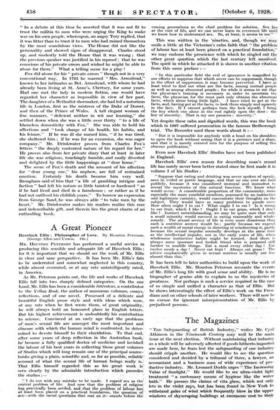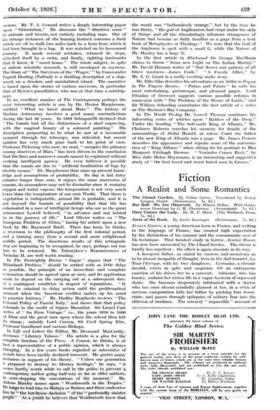The Magazines
" THE Safeguarding of British Industry," writes Mr. Cyril Atkinson in the Nineteenth CentUry may well be the main issue at the-next election. Without maintaining that industry' as a whole will be adversely affected if goods hitherto imported are made here, he fears lest the safeguarding of one industry should cripple another. He would like to see the question considered and decided-- by a- tribunal of three, a lawyer, an accountant and a business man of wide experience of pro- ductive industry. Mr. Leonard Dodds urges " The Increasing Value of Sunlight." He would like to see ultra-violet light treatment " a customary means of hygiene like the water bath." He presses the claims of vita glass, which not onbr lets in the violet rays, but ,has been found in New York withstand gales of wind which frequently blow in the upper windows of skyscraping buildings at enormous cost to thejK owners.' Mr-. T. A. Coward writes -a deeply interesting paper upon " Orientation." He diseusseS the' " directive sense " in animals and insects, not entirely excluding man. One of his strange instances of the homing instinct concerns a duck which set off to -Walk two miles-batik to a farm froin which it had been brought in a bag. It was watched On its honiewird journey: It Made several mistakes, retraced its steps, refreshed itself by a swim, and finally, sighting landmarks that it knew, it " raced home." The whole subject, in spite of ardent scientific research, is still enveloped in mystery. The Story of " The Survivors of the Wager,' " by Commander Taprell Dorling.(Taffrail) is a thrilling description of a ship- wreck on a desolate And uninhabited island. The narrative is based- upon the stories of various survivors, in particular that of Byron's grandfather; who was at that time a- midship- man.
In an excellent number of The Contemporary perhaps the. 'nest interesting article is one .hy. Dr. Hector Macpherson, entitled " What we know about Mars." The history of Martian Astronomy involves- a good many contradictions during the last 50 years.. In .1888 Schiaparelli declared that " The Canals had all the ;distinctness of a steel engraving, with the magical -beauty of a coloured painting."- His description purporting to be what he saw at a favourable moment through his telescope, was ridiculed, but recent opinion has very much gone back to his point of view.. Professor Pickering who now, we read, " occupies the primacy among observers of Mars," has been driven to the conclusion that the finer and narrower canals cannot be explained without evoking intelligent agency. He even believes it possible that the canals are due to " artificial localization of fogs by electric means." Dr. Macpherson thus sums up present know- ledge and assumptions of probability. Its day is but forty minutes -longer than ours, it enjoys the same succession of seasons, its atmosphere may not be dissimilar since it contains oxygen and-water vapour, the temperature is not very much lower than the temperature of our own World. That there is vegetation is indisputable, animal life is probable, and it is not beyond the bounds of possibility that that life has culminated in a race of intelligent beings who are as the great astronomer Lowell- believed, " in advance and not behind us in the, journey of life." Lord Olivier writes on " The European Problem of Africa," basing his article upon a new hook by Mr. Raymond Buell. There has been, he thinks, a reversion to the philosophy of the first colonial period, and a turning away from a second and more enlightened middle period. The disastrous results of this retrograde step are beginning to be recognized, he says, perhaps not too late to be retraced. Mr. Tcharykow's Reminiscences of Nicholas II. are well worth reading.
In The Fortnightly Review " Augur " argues that " The Rhineland Problem " should be settled with as little delay as possible, the principle of an immediate and complete evacuation should be agreed upon at once, and its application, made to depend on the carrying out at a subsequent date of a contingent condition in respect of reparations. " It would be criminal to delay action until the problematical moment when the American creditor makes up his mind to practice leniency." 'Mr. Dudley Heathcote reviews " The Colonial Policy of Fascist Italy," and shows that that policy redounds to the credit of Signor Mussolini. Sir Lionel Cust writes of " An Eton Vintage," i.e., the years 1870 to 1880 at Eton and the great men upon whom the school then left its stamp ; notably Lord Curzon, Sir Cecil Spring Rice, Professor Goodheart and various Bishops.
In Life and Letters the Editor, Mr. Desmond MacCarthy, discusses " Literary Taboos." His article is a plea for the complete freedom of the Press. A Censor, he thinks, is at best a representative of a nubile opinion, which is always changing. In a few years books regarded as subvershe of morals have been- taeitly declared innocent. He quote's many instances in support of his theory. " UfilesS one-generation is prepared to destroy its literary heritage," he says, " it seems hardly worth while 'to call in the police to prevent a :n temporary author going half-Way as far as older mitheit; in over-stepping the conventions of the moment," Mr. Aldous Huxley muses upon " Wordsworth in the Tropics." Re longs to lead him to MalaYa or Borneo and there undeceive hint iii" the hotheuse darkrieSS " of the '" Oral:Mildly sinister langle:" As a' youth he belieVels that -Wotitiieorth knew that the world was "hettonileasly strange," but by the time he was thirty, " the god et Anglicanisnihad crept under the skin of things and all the' Stimulatingly inhuman -strangeness of Nature had becodie flatly faniiliar as a page from a text book of Metaphysics or Theology." We note that the God of the Anglicans is spelt with a small G, while the Nature of Mr. Huxley has a large N.
In the first article in Blackwood Sir George MacMunn claims to threw " Some new Light On The Indian Mutiny." Mr. David Hannan writes of " that flower and pattern of all brave marineni—James Cook." " A Family Affair," by Mr. S. G. Grant is a really exciting snake story.
Mr. Ellis Silas describes his adventures as an Artist in Papua in The Empire Review. " Palms and Paints " he calls his' most entertaining, picturesque, and pleasant paper. laird ' Fitzalan of Derwent suggests various -possible refobus 'in. connexion with " The Problem of the Hotise of Lords," and Sir William Schooling contributes the first article of a series on The Hudson's Bay Company.
In The World To-day Mr. Lowell Thomas continues his interesting series of articles upon " Raiders of the Deep." Under the heading " The Self-Made King of Albania," me. Chalmers Roberts searches his memory for details of the surroundings of Abdul Hamid, at whose Court the father of the new King of Albania was a page. Mr. James PoweiS describes the appearance and repeats some of the conversa- tion of " King Alfonso " when sitting for his portrait to Miss Margaret Fitzhugh BroWne. " Venizelos Comes Back," 'by Miss Julie Helen Heynernan, is an interesting and suggestive study of " the best loved and worst hated man in Greece."























































 Previous page
Previous page